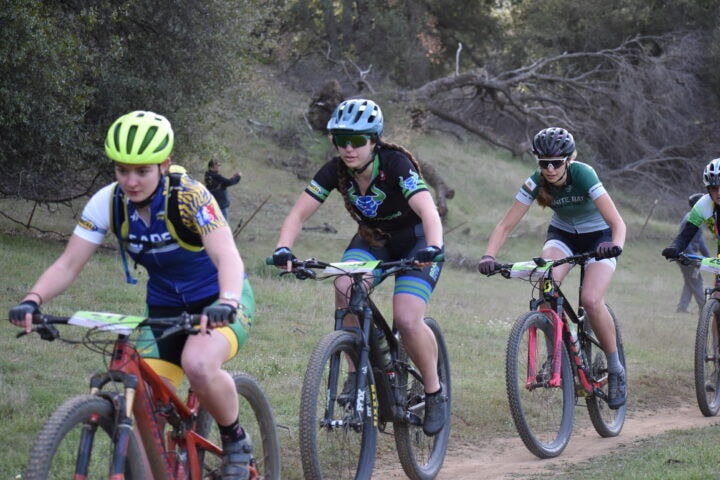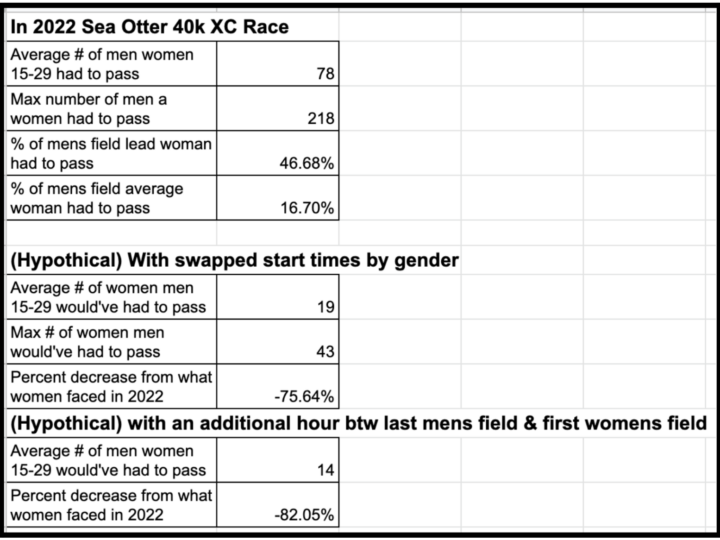Heading out the door? Read this article on the new Outside+ app available now on iOS devices for members! Download the app.
Hayley Yoslov is deep into final exam week of her second-to-last semester of high school.
She turns 18 next week. Ostensibly, after she fills in all the bubbles, answers the essay questions, and gets the final grades, she can put this chapter of school behind her and focus on the few short months that stand between her and graduation.
The thing is — one of her final projects has taken on a life far beyond the school walls.
Yoslov, a senior at The Branson School, a private high school in Marin County, California, is the author of a petition on change.org that is gathering signatures with astonishing force. The name of the petition is ‘Let Women Ride: Improve Gender Equality in The Sea Otter Classic,’ and it’s Yoslov’s final project for her Ethics & Justice course at school.
In it, Yoslov, who raced the 40k cross-country race at Sea Otter last year, argues that the current start format greatly disadvantages riders in the female category by starting them after all riders in the male categories. She backs up her argument with data points from last year’s race and offers potential solutions.
The petition is nearing the 1,500-signature mark, which is a far cry from Yoslov’s original goal of 100. It’s been signed and shared by people well-known in the cycling world, including Kate Courtney, who is also an alumna of the Branson School and its mountain bike team.
Yoslov has also reached out to the race organizer to share the petition and her thoughts. She has received two emails back — the first she called “a little disappointing,” and the second “slightly more promising.”
This final project is far from over.
The racing
Over 70,000 people attended Sea Otter in 2022, with 6,400 signing up to race, according to event owner Life Time.
Yoslov was one of the many, and she was stoked to line up for her first Fuego XC 40k, which she said is the event’s most popular mountain bike race.
During the school year, Yoslov races for the Branson Mountain Bike Team, which is part of the National Interscholastic Cycling Association’s beloved NorCal League. Most of her experiences on the team have been positive, including GRiT programming (GRiT is NICA’s national initiative to recruit and retain more female student-athletes and coaches), as well as racing.
Yoslov said that, while the high school sport isn’t immune to disparities like shorter race distances for girls and fewer girls than boys participating overall, she hasn’t experienced any issues on the race course itself.
In fact, Yoslov said, “within NICA there’s a huge emphasis on equality which I appreciate.”

Her bubble burst upon racing at Sea Otter.
“I lined up with the 17-18 women, and I was near the front of the group so passing within the women’s group wasn’t really an issue,” she said. “Once we started riding immediately we started hitting other riders. We were put in behind the tandem riders. I think tandem riders are the coolest people ever but passing them was difficult.
“As the race went on, it was more and more singletrack, and I was just getting stuck after guy after guy. On the downhill, it’s impossible to pass, so I was riding my brakes, down in my saddle unable to pass. On the fire road, I’d be sprinting trying to pass all those people. It kinda destroyed my race plan.”
Yoslov had experienced what has become the norm during Sea Otter’s cross-country mountain bike races — due to how the race starts are staggered by gender, faster women tend to catch slower men and expend much of their effort trying to navigate around them.
As she writes in the change.org petition, “it ruins the racing experience and shifts the challenge of the race from a physical challenge to simply navigating other racers. There is absolutely no reason why capable young women should be starting behind 70-year-old men.”
The experience was so disconcerting to Yoslov that she planned to write a letter to the race organizer to see if anything could be done differently this year.
The prompt
Just as Yoslov was about to hit send on an email to the Sea Otter race organizers, divine intervention came in the form of a prompt from her Ethics and Justice teacher.
Find one specific social justice issue and propose one or more solutions. The issue could begin with poverty, segregation, housing discrimination, food insecurity, over-policing, educational inequity, or climate change— to name a few. You must do research that goes beyond the intellectual (ie: reading articles/books, listening to podcasts, watching videos). You are required to conduct at least one interview with someone who is working in this field or has first-hand experience.
Yoslov didn’t set out to go up against corporate bigwig Life Time when considering her senior project, but the timing was fortuitous. She had already started looking at the social and clinical gender gap in sports and performance and as she started to formulate her email to Sea Otter, “I realized this was the exact same issue,” she said.
“I asked my teacher about it, and she was psyched that I found something so specific. At times I was like, ‘should I really be doing this? This is just my issue.’ And she said, ‘I think you’ll really be surprised with how many people agree with you.'”
As part of Yoslov’s research, she and her teachers did some data processing using last year’s results. The results, Yoslov said, were “powerful.”
“We found that on average, a female racer aged 17-29 had to pass 78 men throughout the course, with the leaders passing up to ~218 men. This doesn’t count the DNF’s, repeated passes, or passing within women’s categories for these riders. Also, if the two fields had been separated by one additional hour, a female racer would’ve passed, on average, only 14 male racers, which is an 82 percent decrease.

They repeated the experiment with swapped start times (ex: women 15-16 starting when men 15-16 started and vice versa) and found that “if the men’s and women’s category start times had been swapped by gender, the average male racer aged 15-29 would have passed on average 19 women throughout the course (a 75 percent decrease from what women faced), with the leaders passing up to approximately 43 women.”
Yoslov felt this would be an effective solution and posed it in her email to the race organizers. She also offered three other ideas:
- Sort riders by ability (Cat 1, 2, 3, etc…) in addition to gender and age
- Sort existing categories by median times per category from Sea Otter 2022
- Start men’s and women’s categories at much a larger interval (1+ hour) from each other to drastically reduce passing issues
Jeff Frost, the longtime race director at Sea Otter, replied to Yoslov nearly immediately.
“We have changed much from 2022. But maybe there is a bit more we can do — the biggest challenge is the limited time and venue constraints we have available to produce races,” he wrote.
Yoslov said that she felt the response was “placating,” and “a little disappointing.” Meanwhile, the signatures on the petition were creeping toward 1,500, largely due to the help of people like Courtney and Yuri Hauswald, another off-road industry insider from northern California, who were sharing the petition online.
Currently, Yoslov is in a position of wait-and-see, but she’s already decided that when school gets out for the semester, she’s not leaving the project behind. She has plans to race at Sea Otter again in April, although she said she won’t race in the 40k again unless something changes.
She hopes it does.
“I’d consider doing the 80k, which is two laps, if things don’t get changed because it was such a frustrating experience. But I’d hate to be forced to change due to that,” she said.
“For such a high quality and well-planned event, surely something can be done.”